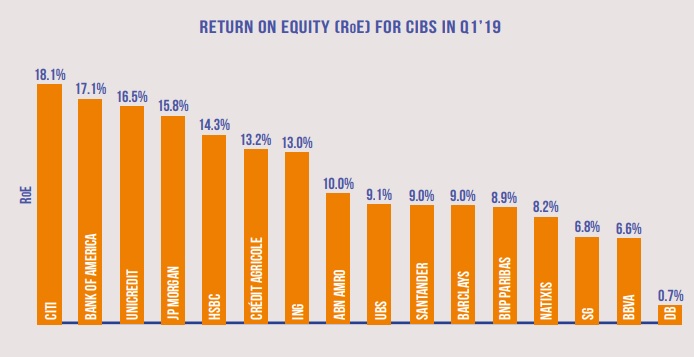
Banks in Europe have been in a difficult spot lately. A new report reveals that financial institutions across the region faced serious difficulties in the 2018 financial year, and despite all the cost cutting that followed, haven’t managed to compensate the revenue decline in 2019. Historically low interest rates, new regulatory hurdles and competition from U.S. banks have all added to the hardship.
Also read: Another Bank Run Highlights China’s Brewing Financial Crisis
Corporate and Investment Banks See Declining Revenues
The financial industry in Europe is facing some fundamental constraints such as cost inelasticity, revenue decline and talent evasion. The European CIB Outlook 2019, a study published recently by the consulting firm Eurogroup Consulting, is centered on how the continent’s corporate and investment banks (CIS) can address these challenges.

Other threats they have to deal with stem from the economic and regulatory environment, which has been deteriorating. These include interest rates that have reached historic lows, new stringent regulations requiring compliance and increased market volatility. European banks had to make infrastructure investments while being forced to significantly reduce spending at the same time.
According to the researchers, “In FY 2018, a large majority of European CIBs experienced negative Jaws.” In finance, the ‘jaws ratio’ is an indicator measuring the difference between income growth rate and expenses growth rate.
During the 2018 financial year, overall CIB revenues grew by 3.5%. The upward movement was catalyzed mainly by equity and prime services as well as a favorable exchange rate, the authors of the study note. By the first quarter of 2019, however, equities and prime businesses had fallen by 21.6%. That caused a 10% year-over-year drop in operating revenues. The report concludes:
Cost reduction programmes have struggled to keep pace with top line decline, combined with increased volatility in the market and unprecedently low interest rates.
Digitalization Offers a Way Out
Eurogroup Consulting points out that the study has assessed how European CIBs can bridge the performance gap with U.S. banks, which have been able to strengthen their position abroad thanks to two main factors – a stronger domestic market and more favorable regulatory landscape. Corporate and investment banks on the Old Continent should consider structural changes, the consulting firm says, in order to address the fundamental constraints they are facing.
European banks must focus on asset industrialization, for instance, aiming to achieve a return on equity (RoE) increase of between 2 and 4%. They can also gain from structured finance opportunities with revenue growth leading to RoE improvement of around 2 to 3%. Last but not least, talent empowerment can get them a RoE expansion of up to 2%.

One the main goals of the report is to seek ways for European CIBs to optimize their costs and re-energize their talent, as the authors put it. Quite naturally, in a time of rapid digital transformation one of the paths to achieving that is through “digitalization, whereby digital initiatives will only be successful by aligning their strategy to the scale of disruption and maturity.”
Disruption and maturity is actually what some European countries and their banks have been demonstrating. In Switzerland, whose crypto valley has become home to over 700 companies, traditional banks have started to team up with fintechs to offer cutting edge digital services. And the Swiss government recently presented a set of wide-ranging proposals to update its banking, corporate and financial infrastructure laws to accommodate the digital asset industry.
Or take Germany as another example, where new legislation is going to allow banks to receive, store, and sell cryptocurrencies starting from next year. A partnership between a crypto platform and a local bank there already offers clients the chance to buy and sell cryptocurrency directly from their bank account, which comes with an integrated bitcoin wallet. Besides, a growing number of companies, such as Cred for instance, provide global banking services tailored to the specific needs of crypto users.
Do you think integrating cryptocurrencies will help European banks to improve their financial results and gain an edge in competition with their U.S. peers? Share your thoughts on the subject in the comments section below.
Images courtesy of Shutterstock, Eurogroup Consulting.
Do you need a reliable bitcoin mobile wallet to send, receive, and store your coins? Download one for free from us and then head to our Purchase Bitcoin page where you can quickly buy bitcoin with a credit card.
The post European Banks Struggle With Low Interest Rates and Strict Regulations appeared first on Bitcoin News.

Bitcoin.com is author of this content, TheBitcoinNews.com is is not responsible for the content of external sites.
Our Social Networks: Facebook Instagram Pinterest Reddit Telegram Twitter Youtube











